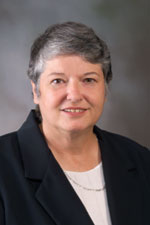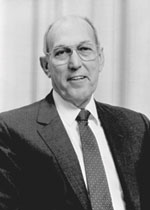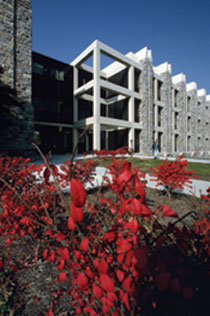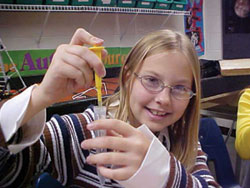In the working world, many people do what they can to "give at the office." Co-workers purchase cookies from a colleague's child to support fundraising efforts, employees chip in to buy flowers and presents to mark special occasions, and staff members always seem to enjoy the time-honored holiday tradition of the "white elephant" gift exchange. Rarely, though, are employees asked to give money back to their company for the good of the company.
Among those who work for a university, however, "giving back" can often involve just that. At Virginia Tech, employees are offered the opportunity to support the university through the Faculty/Staff Annual Fund campaign, "Supporting Our Own." Gifts made to the fund can be designated to any area on campus or used to support the Employees' Spouse/Dependent Scholarship Fund.
Over the past year, the fund raised $22,557 that was distributed around campus. A significant part of the fund's success can be credited to the example set by Sharron Quisenberry, dean of the College of Agriculture and Life Sciences. Virginia Tech is indeed fortunate that the faculty/staff fund has such a passionate backer in one of the university’s most active deans.
 Sharron Quisenberry,
Sharron Quisenberry,
dean of the College
of Agriculture and
Life Sciences
|
In April, Quisenberry wrote letters to the faculty and staff in the College of Agriculture and Life Sciences urging them to support the Faculty/Staff Annual Fund. But before she sent the letters, she signed on to the University Development website and made a generous pledge to her college and to the W.E. Skelton 4-H Educational Conference Center. "If you work for a university, part of your job is supporting the students and their environment," says Quisenberry. "In order for the students to have the best resources, you have to support the faculty and staff. We need student scholarships and endowed chairs and professorships. This is how we build departments, so supporting my own college was a painless decision."
Quisenberry also sees supporting the faculty/staff fund as a way of valuing the excellence and talent on our campus. "Giving back is a tribute to my faculty and staff. They are the engine of my college, and supporting their programs and professional opportunities is the least I can do," says Quisenberry. "Giving back to the college isn't an obligation. I'm proud of the work we're doing and I want to be involved personally."
Perhaps even more impressive is that Quisenberry's commitment to the Virginia Tech Faculty/Staff Annual Fund isn’t based on a long history with the university. She has been on the Blacksburg campus only since August 2003, when she was named dean after having served as the head of the Department of Entomology at the University of Nebraska-Lincoln for four years. Quisenberry holds a Ph.D. and an M.S., both in entomology, from the University of Missouri-Columbia; an M.A. in environmental biology from Hood College; and a B.S. Ed. in biology from Truman State University--all schools she supports to this day.
|
Max Bales, director of development for the College of Agriculture and Life Sciences, admits that the gift isn't surprising because Quisenberry is such an involved dean. "While all of the faculty and staff understand what development can do for them, not everyone realizes the importance of making an investment themselves," notes Bales. "Dean Quisenberry has led from the front. She has traveled the state from the Eastern Shore to the western tip, meeting and engaging stakeholders, listening to them, and sharing her ideas for the future of the college. She has high expectations for development’s role in her strategic plan for the college, but her involvement goes beyond the drawing board."
Jacqueline L. Nottingham, director of Annual Giving and Special Gifts, acknowledges that the faculty/staff campaign is an important avenue for those on campus to give back to the university. "Working for Virginia Tech isn't a 9-to-5 kind of job. We're all Hokies," she says. "This fund is one way to allow faculty and staff to personalize their gift back to Virginia Tech. Dean Quisenberry is leading by example and raising the bar for others. She's showing how important our campus is to her, even though she's been here only a short time."
Based on the designations made by its donors, the Faculty/Staff Annual Fund works to support all aspects of the university. One such designation is the Virginia Tech Employees' Spouse and Dependent Scholarship Fund, which awards scholarships to Virginia Tech students whose parents or spouses work for the university.
Tom McAvoy, chair of the Faculty/Staff Annual Fund committee, says, "In our first year, 2000, we were able to give two scholarships. This past spring, we were able to award 13 scholarships, all through the growth of the Faculty/Staff Annual Fund. In addition, several past presidents have contributed to an endowment within the fund, making it a solid, long-term program. Luckily, we haven't had to use that money yet, due to the growing annual cash support from the campus. We're very pleased to be able to help."
To find out more about the Faculty/Staff Annual Fund and the Employees' Spouse and Dependent Scholarship Fund, visit http://www.givingto.vt.edu and click on the "Your Annual and Class Gifts" link.
|
This spring, 13 incoming freshmen were awarded 2005 Employees’ Spouse and Dependent Scholarships. Since 2000, 53 students have received scholarships from the fund.
|
Kiley Thompson McMichael is assistant director of annual giving for direct mail.
Amy Boyce is special projects editor for the Office of University Development.
|
Fralin's simple words are shaping the future by Judith Davis
|

“My theory is that you
take life one step at a time
and do the best you can.
The rest will follow.”
Horace G. Fralin ’48
|
"Start your future now," a 1948 Bugle advertisement urged graduating seniors at Virginia Polytechnic Institute (VPI). The charge was equally apt for the Blacksburg institute destined to become a comprehensive research university.
In 1948, VPI (later Virginia Tech) was building momentum for a sweeping expansion to accommodate 6,000 students by the year 1955. Among the proposed buildings were a new library on the mall and a war memorial with eight pylons that would one day crown the Drillfield.
Decades later, Virginia Tech's journey into the future continued with the 1995 dedication of another building: the Horace Fralin Biotechnology Center, named for its benefactor, Horace G. Fralin (electrical engineering '48), who changed the face of Virginia Tech by simply adding a few sentences to his will.
A native of Roanoke, Va., Fralin graduated from Jefferson High School at the age of 15. He was, in his words, eager to "get on with being an adult." He enrolled at VPI, but two years later, at 18, he interrupted his studies to serve in the Army during World War II. After returning to earn his degree, Fralin became a successful businessman, civic leader, and philanthropist whose extraordinary financial support and service to Virginia Tech earned him the Alumni Distinguished Service Award and the Ruffner Medal, the university’s highest honor.
|
Capping a lifetime of generosity to his alma mater, Fralin made an $8.9 million bequest benefiting Virginia Tech, launching one of the largest gifts in the university's history when he placed a brief clause in his will. A major portion of his legacy was earmarked for the biotechnology center.
Two years after Fralin's death, the center bearing his name became a reality. This fall, the Fralin Biotechnology Center celebrates its first decade of interdisciplinary research, instruction, and outreach. With substantial implications for the future, biotechnology puts cellular activity to practical uses, such as food production, DNA analysis, water decontamination, and disease control.
At the Fralin Center, scientists from multiple academic areas pool their expertise to address these and other complex issues. One facet of biotechnology, for example, blends research in chemistry, agriculture, biology, and environmental science to create animal feed that yields less environmentally damaging waste. The center's laboratories and classrooms serve both graduate and undergraduate students. A new graduate program in the molecular plant sciences brought six new doctoral students to Virginia Tech this fall.
Spanning generations, outreach programs at the Fralin Biotechnology Center educate and engage high school and community college students and their teachers in Virginia and across the nation by providing professional development and hosting an annual biotechnology conference.
|

Fralin Biotechnology Center
|
 Middle-school student Brittany Middle-school student Brittany
experiments with Biotech-in-a-Box.
|
The center's signature Biotech-in-a-Box loan program circulates equipment, materials, and manuals among schools wishing to perform classroom experiments. So far, the program has given 88,000 students an opportunity to experience hands-on scientific research.
The future begins with simple moments as well as with great events. Perhaps a student, fascinated by an immunology experiment, begins a career in science. Perhaps a research team makes a discovery that changes the world. And perhaps a forward-thinking individual places a few words in his or her will, establishing a legacy that shapes the future.
Horace Fralin was one such individual.
|
To learn how you can make a gift to Virginia Tech by simply adding a few brief sentences to your will, contact the Office of Gift Planning by phone at 800/533-1144 or e-mail giftplanning@vt.edu. Or visit our new website at http://www.givingto.vt.edu for sample bequest language and other information about charitable giving.
|
Judith Davis is a publications editor in the Office of Gift Planning.
|